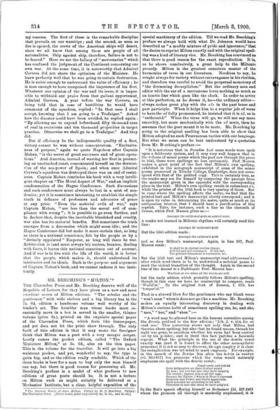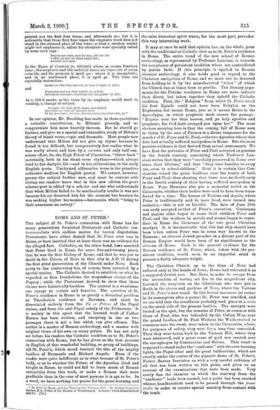MR. BEEOHING'S "MILTON."*
THE Clarendon Press and Mr. Beeching deserve well of the Republic of Letters, for they have given us a new and most excellent series of Milton editions. "The scholar and the gentleman" with wide shelves and a big library has in the 7s. 6d. edition a handsome volume well worthy of the binder's art. The humbler man whose books must oc- casionally move in a box is served in the smaller, thinner volume (price 8s.), printed on the exquisite special paper of the Clarendon Press, which feels like tissue-paper, and yet does not let the print show through. The only fault of this edition is that it may make the foreigner think that Milton was a poet with a very meagre output. Lastly comes the pocket edition, called "The Oxford Miniature Milton," at 3s. 6d., also on the thin paper. This is the volume for the traveller. It will go into a big waistcoat pocket, and yet, wonderful to say, the type is quite big, and so the edition really readable. Which of the three books is best for a man to buy only the man himself can say, bat there is good reason for possessing all. Mr. Beeching's preface is a model of what prefaces to new editions of great poets should be. It is not a lecture on Milton such to might suitably be delivered at a Mechanics' Institute, but a clear, helpful exposition of the • The Poetical Works of John Milton. Edited by H. C. Beaching. Oxford ; The Clarendon Press. [Three issues, price respectively 8s., 7s. 6d., and 3s. 6d.] special machinery of the edition. Till we read Mr. Beeching's preface we always held with what Dr. Johnson would have described as "a muddy mixture of pride and ignorance," that the desire to reprint Milton exactly and with the original spell- ing was a kind of literary vice. Mr. Beeching has convinced us that there is good reason for the exact reproduction. It is,
as he shows conclusively, a great help to the lifiltonio prosody. Milton is the greatest conscious master of the harmonies of verse in our literature. Needless to say, he sought always for variety without extravagance in his rhythm, and therefore was careful to avoid the perpetual monotony of "the drumming decasyllabon." But the ordinary man and editor with the ear of a metronome loves nothing so much as an iambic line which goes like the clock. In order to arrive
at this perfection, as he deems it, he—the ordinary editor— always makes great play with the eels in the past tense and past participle. When it helps him to a regular jolt of verse to have the eel fully pronounced, he insisted that it is id, as in "enthroned." When the verse will go, we will not say more smoothly, but more mechanically with the eel mute, then he assumes that the poet meant it to be mute. Mr. Beeching by going to the original spelling has been able to show that Milton adopted no such Procrustean tactics with our language. Bat what we mean can be best understood by a quotation from Mr. Beeching's preface :— "It is notorious that in Paradise Lost some words were spelt upon a deliberate system, and it may very well happen that in the volume of minor poems which the poet saw through the press in 1645, there were spellings no less systematic. Prof. Masson makes a great point of the fact that Milton's own spelling, exhibited in the autograph manuscript of some of the minor poems preserved in Trinity College, Cambridge, does not corre- spond with that of the printed copy. This is certainly true, as the reader may see for himself by comparing the passage from the manuscript given in the appendix with the corresponding place in the text. Milton's own spelling revels in redundant e's, while the printer of the 1615 book is very sparing of them. But in cases where the spelling affects the metre, we find that the printed text and Milton's manuscript closely correspond ; and it is upon its value in determining the metre, quite as much as its antiquarian interest, that I should base a justification of this reprint. Take, for instance, such a line as the eleventh of Comus, which Prof. Masson gives as :- Amongst the enthroned gods on sainted seats.
A reader not learned in Miltonic rhythms will certainly read this line:
Amongst th' enthroned gods
But the 1645 edition reads :
Amongst the enthron'd gods
and so does Milton's manuscript. Again, in line 697, Prof. Masson reads
It shall be in eternal restless change Self-fed and self-consumed. If this fail, The pillared firmament is rottenness, &c.
But the 1615 text and Milton's manuscript read se/f-consum'd ; after which word there is to be understood a metrical pause to mark the violent transition of the thought. Again in the second line of the Sonnet to a Nightingale Prof. Masson has :
Warblest at eve when all the woods are still
but the early edition, which probably follows Milton's spelling, though in this case we have no manuscript to compare, reads Warbrst.' So the original text of Samson, 1. 670, has temper'st."
That is a shrewd blow for the gentlemen who say blank verse "won't scan" when it does not go like a machine. Mr. Beeching makes an equally interesting discovery in dealing with Milton's curious habit of sometimes spelling me, he, and she, 'mee," " hee," and "shee " :— "A word may be allowed here on the famous correction among the Errata prefixed to the first edition ; 'Lib. 2. v. 414, for we read wee.' This correction shows not only that Milton had theories about spelling, but also that he found means, though his sight was gone, to ascertain whether his rules had been carried out by his printer ; and in itself this fact justifies a facsimile reprint. What the principle in the use of the double vowel exactly was (and it is found to affect the other monosyllabic pronouns) it is not so easy to discover, though roughly it is clear the reduplication was intended to mark emphasis. For example. in the speech of the Divine Son after the battle in heaven (vi. 810-817) the pronouns which the voice would naturally emphasise are spelt with the double vowel : Stand onely and behold Gods Indignation on these Godless pourd By mee ; not you but mee they have despls'd, Yet envied ; against mee is all thir rage, Because the Father, t'whom in Fleav'n supream Kingdom and Power and Glorie appertains, Bath honourd me according to his will. Therefore to mee thir doom he hath assig'n'd.
In the Bon's speech offering himself as Redeemer (iii. 227-249) where the pronoun all through is markedly emphasised, it is printed ones the first four times, and afterwards one; but it is noticeable that these first four times the emphatic word does not stand in the stressed place of the verse, so that a careless reader might not emphasise it, unless his attention were specially called
by some such sign :
Behold mee then. mee for him, life for life I offer, on mee let thine anger fall ; Account mee man.
In the Hymn of Creation (v. 160-209) where ye occurs fourteen timeP, the emphasis and the metrical stress six times out of seven coincide, and the pronoun is spelt yes; where it is unemphatic, and in an unstressed place, it is spelt ye. Two lines are espeeially instructive :
Speak yee who best can tell, ye Sons of light (L 160);
and
Fountains and yee, that warble, as ye flow, Melodious murmurs, warbling tune his praise' (1. 195).
In v. 694 it marks, as the voice by its emphasis would mark in reading, a change of subject :
So wake the false Arch-Angel, and infus'd Bad influence into th' unwarie brest
Of his Associate; hee (i.e., the associate) together calls,
In our opinion, Mr. Beeching has made in these quotations a valuable contribution to Miltonic prosody, and we congratulate him most heartily thereon. But he should go further, and give us a special and exhaustive study of Milton's theory of blank verse,—epic and dramatic. Most people now understand that Milton did not give up rhyme because he found it too difficult, but comparatively few realise what he was really about, and how, by a curious and only half-con- scious effort, he, the High Priest of Classicism, "threw back" metrically, both in his blank-verse rhythms—which always tend to the dactylic lilt—and in his alliterations, to the early English poets. Unrhymed alliterative verse is the primitive authentic medium for English poetry. We cannot, however, pursue the subject further now, and must be content with letting our readers know that in this new edition the great scholar-poet is edited by a sch(.1ar and one who understands that when Milton failed to be mechanically iambic it was not because his ear deserted him for the moment but because he was seeking higher harmonies,—harmonies which "bring to their sweetness no satiety."







































 Previous page
Previous page